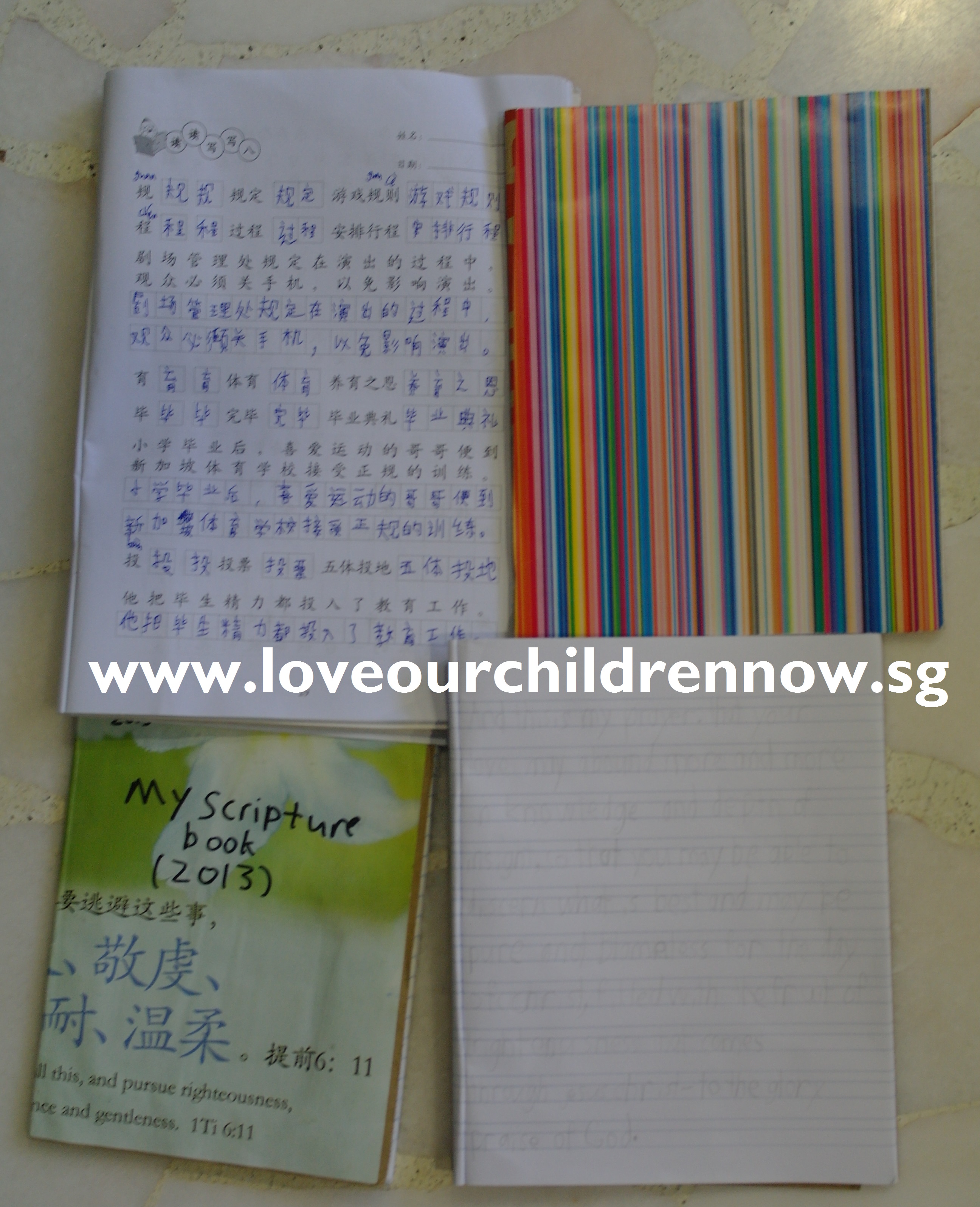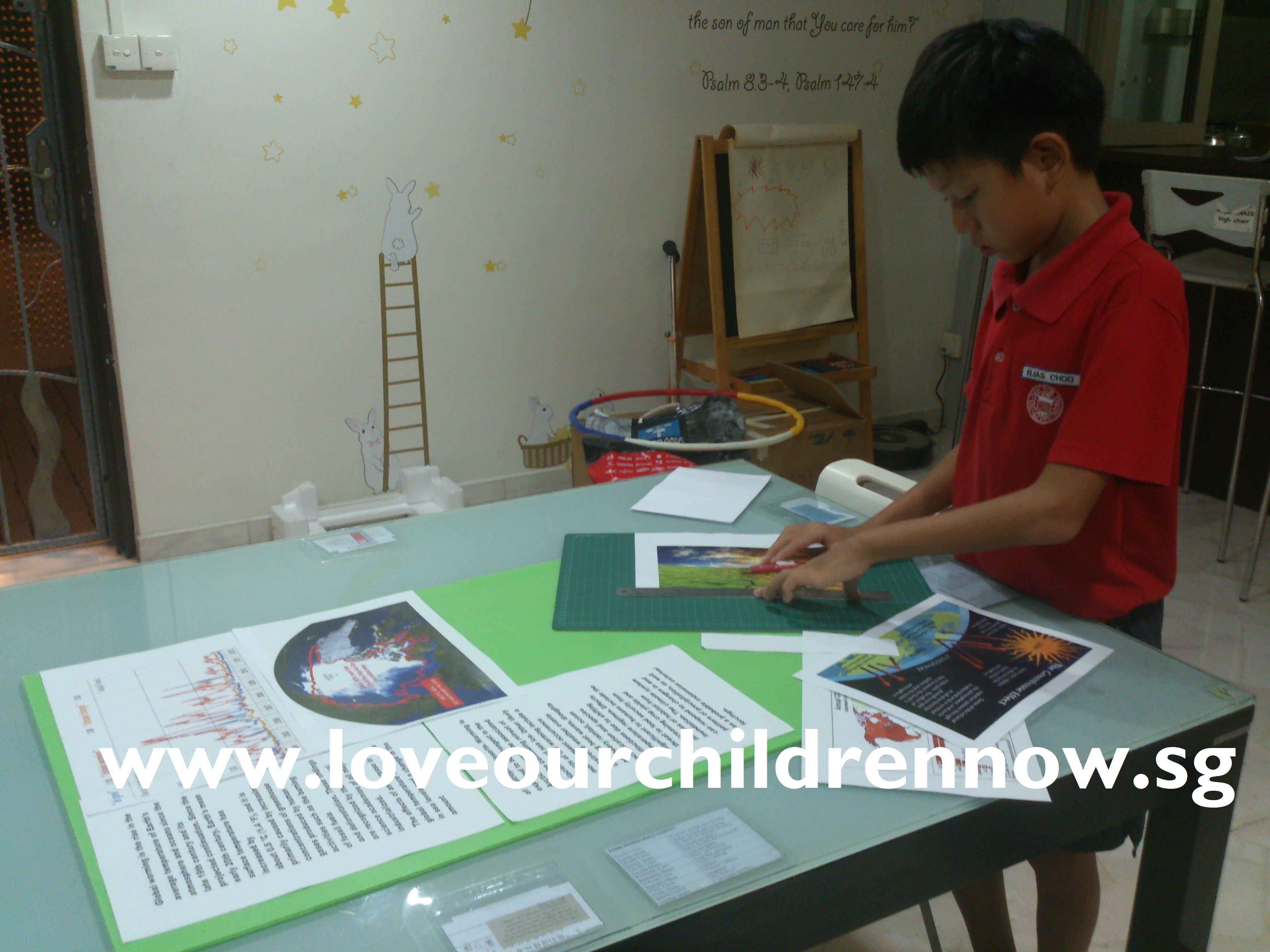Parenting continues after the PSLE
I have been living the happy post-PSLE/examination days – happy because I now have the luxury of time firstly to continue training my sons in things which are important to me, and secondly, to allow them to continue learning at a leisurely pace.
No, I do not believe in all play and no more work after the PSLE. To me, the PSLE is just an examination, and after a short break of 2-3 days, we move on with normal life. That normal life means some amount of work, some amount of rest and continuous learning. This included my Secondary school boy whose term ended early, and who was therefore VERY FREE.
They now have to do some housework everyday, copy bible verses, copy Chinese words/ phrases/ sentences(习字) , memorise Chinese phrases (默写), read an English vocabulary book, and watch Chinese videos on a daily basis, except for the weekends, when the load is reduced mainly because we have many family activities then. In addition, Elias has to spend at least an hour practising his flute everyday. Well, they need to back-paddle to train themselves up in these areas which we failed to train them in before the examinations.

Elias enthusiastically decorated his books.
The 3-lined writing on the right was done by Samuel just today,
supervised by Elias.
I think it would be a good idea to get Samuel
to copy scriptures daily too. Heh Heh…
A friend was amazed that my boys agreed to the routine. I honestly told her that it was because my children never worked very hard for the PSLE or their examinations in general. We did work SOMEWHAT harder, but we never had the crazy schedule that most children went through.
I recalled reading about a top scorer who only took a 30 minutes dinner break during which she also watched TV. This year, I read about a girl who stopped reading books for leisure for 3 months, and another girl who had remedial lessons in school four times a week and tuition for all subjects every day, including weekends. Wow! I salute them and their parents!
I suppose that is why after the PSLE, many children are given the freedom to play as much as they want to.
That really troubles me in two ways, and it is something I would NOT do, even if my children did work very hard during the examinations.
Firstly, it sends the wrong message to the children – that learning is only for the examinations.
At my workplace, we teach dyslexic children to read, and my colleague has a student who just took his PSLE. She said that he was two different persons before and after the PSLE, not just in terms of his motivation, but also in terms of his ability to think. After his PSLE, his thinking became more laborious because he plays all day, and only works for that 1-2 hours a week when he goes for therapy. In his own words – “Exams are over, work for what?”
Use it, or lose it. As adults, my husband and I are continuously learning, I do not see why my children should ever stop, since their minds are much more nimble and absorbent than ours.

The school tries to occupy them after the PSLE.
Elias had to do a exhibition panel on “Global Warming”
He was the leader of the 4-member project.
He did research, found photos, and asked to use
materials we had at home.
He did it all in one night, with minimal help from any of us.
I am so proud of him.
Secondly, I am always against giving too much freedom to children, especially giving it to them SUDDENLY like that.
In the parenting course which my husband and I facilitate, we talk about the concept of pre-mature freedom. The concept is simple – giving the child too much freedom before he has the maturity to manage that freedom, is detrimental to the child. The reason for that is because freedom is addictive, and like any drug, you would want more and more of it. If you give a child pre-mature freedom in one area of his life, it would accustom him to that level of freedom in other areas of his life, and you would find the child difficult to manage. Many parenting challenges come from this.
For example, if a 5-year old is given a personal phone, which allows him to call anyone, and play any game anytime he wants, it would be difficult for his parents to want to dictate what he eats or wears, or when he can watch TV or needs to do his work.
This applies for older children too, and although increasing amount of freedom must be given as the child grows up, it is important to match it in tandem to the child’s maturity to handle his freedom responsibly.
Anyway, it’s usually a bad idea to SUDDENLY give a lot of freedom to someone, whatever stage that person is at. The feeling is exhilarating, and if you do it when the child is twelve, it will be something which is extremely difficult for the parents to take back in the teenage years, which are difficult as it is, with the onset of puberty.
So for us, it is the usual family-oriented fun, with a bit of individual freedom thrown in.

We went on our favourite night picnic again.
We had fun in Melaka too, having fun normal families have –
playing around in the shopping mall,
shopping, eating,
and bingeing and vegetating in front of the TV.
Yes, we are very authoritative in our parenting – more control than permissive. We know. We can get away with it because of the strength of our relationship with them. But I know that we are parenting on borrowed time because the resistance will increase as they grow older, and we have to ensure they acquire the maturity for wise self-governance soon.
Until that happens, and as far as we can continue to maintain our authority, we must hold our ground. We would be abdicating our responsibilities as parents if we do not.

Sw, I have read. Thank you.